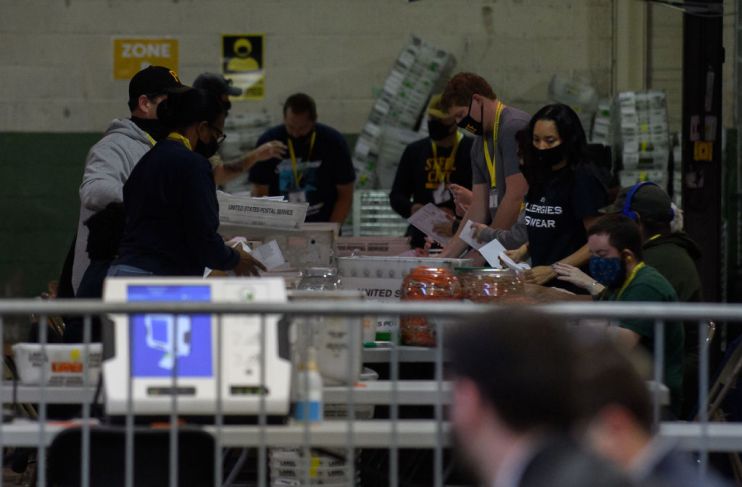Covid crisis is an opportunity to put digital at the heart of our democracy

It’s official: the long-awaited climax of the London Mayoral race is scheduled for May 6th, when polling stations across the city will throw open their doors for the first time since the start of the pandemic. But in a world now heavily mediated by online interaction, questions must be asked as to why this opportunity to digitise British civic participation has been overlooked.
Londoners are being asked to social-distance, mask up and Bring-Your-Own-Pencil as they make their choice between the front-running incumbent Sadiq Khan and his rivals on so-called ‘Super Thursday’.
Yet despite the Covid-induced hiatus in opportunities for democractic participation, experts are warning that the city’s stubbornly high ‘R-rate’ will drive down the turnout rate and threaten the mandate of the victorious candidate.
Read more: Sadiq Khan seeks permission to appeal ‘unlawful’ Streetspace ruling
This conundrum neatly exemplifies why total dependence on in-person interaction is a flaw in our democratic model. If we want to accelerate the capital’s recovery, now is the perfect moment to start pioneering ambitious new routes for citizens to exercise their democratic rights.
As things stand, the use of digital solutions for voting and civic consultation in London is incredibly rare, most often reserved for small-scale public involvement in local budget allocation. Concurrently, our neighbours in several European metropolises are proving that user-friendly online portals can be a godsend for societies plagued by a fragmented civic-consciousness. This begs the question: why is London lagging behind?
It’s been 12 months since we were struck by the first wave of COVID-19; meaning there would have been time to seize the initiative and set wheels in motion for a nation-leading, digital-first London Mayoral election. We can’t recover the lost time, but we can now call for collective acknowledgement that a return to the ‘old normal’ is no longer desirable. Now is a moment to step away from quick-fix solutions and workarounds and to start writing a new chapter in our democratic history.
With only three months to go, it’s no longer feasible to deliver a wholesale switch to online voting for this Mayoral contest. The implementation of sustainable long-term solutions cannot be rushed; it demands careful preparation and extensive consultation in order to win voter trust. But even complex systems, such as those needed for the verification of residents’ voter eligibility, could be based on the blueprints of successful international pilots.
Read more: Social mobility could be the next hot-button issue – and smart firms would be wise to act now
Public participation rates in future e-votes will depend both on trust levels and awareness. Securing this will necessitate new digital platforms to be hosted by trusted bodies (like the Greater London Authority, who are already leading the charge with their own online participation portal), investment in the communication of new initiatives, and close collaboration with community influencers and organizers.
Sticking to the status quo might be the ‘easier’ option, but it’s not the option which is best for London. With COVID having ripped apart the city’s economic and social fabric, grassroots participation in decision making has never been more essential. It would be a mistake to pass over the opportunities which now lie in front of our local authority leaders; opportunities to experiment with methods of digital engagement and lay the foundations for much-needed system overhaul.
This election cycle will not see door-to-door canvassing or town-hall debates; but these valuable hallmarks of British democractic engagement must be replaced, not removed. Between today and May 6th, simple digital platforms could be rolled out to crowdsource policy ideas, to communicate key manifesto pledges, and to encourage democractic dialogue between Londoners and their prospective leaders. This could serve as groundwork for more ambitious digital projects, with sights set on the next local election cycle in 2022.
Of course, moving elections wholly online is not a perfect solution, and it never will be. Not every Londoner will be able to (or want to) engage with democracy digitally, and we cannot leave these citizens behind. The gold-standard is a flexible combination of digital and physical engagement strategies, designed to maximise public engagement and participation across multiple demographic divides. It’s not impossible – Newham council found this combination approach to work successfully when consulting with residents in the midst of the pandemic.
With Sadiq a firm favourite with bookies, it’s unlikely that London will see a change in Mayor this spring. However, there is a chance that we will see a change along different lines: an acknowledgement that we can no longer cling to outdated models of democratic participation. With Londoners readying themselves to drive the post-pandemic recovery, leaders must ready themselves to listen, consult, and co-create the future.